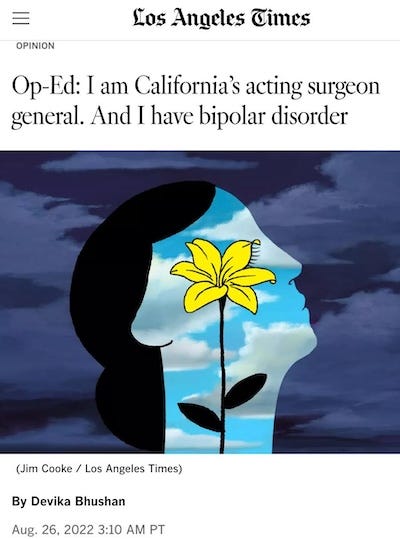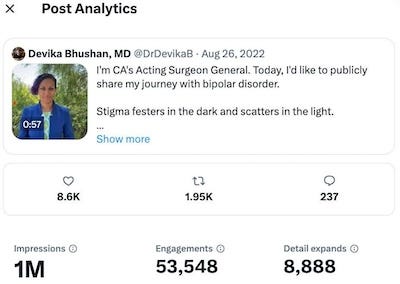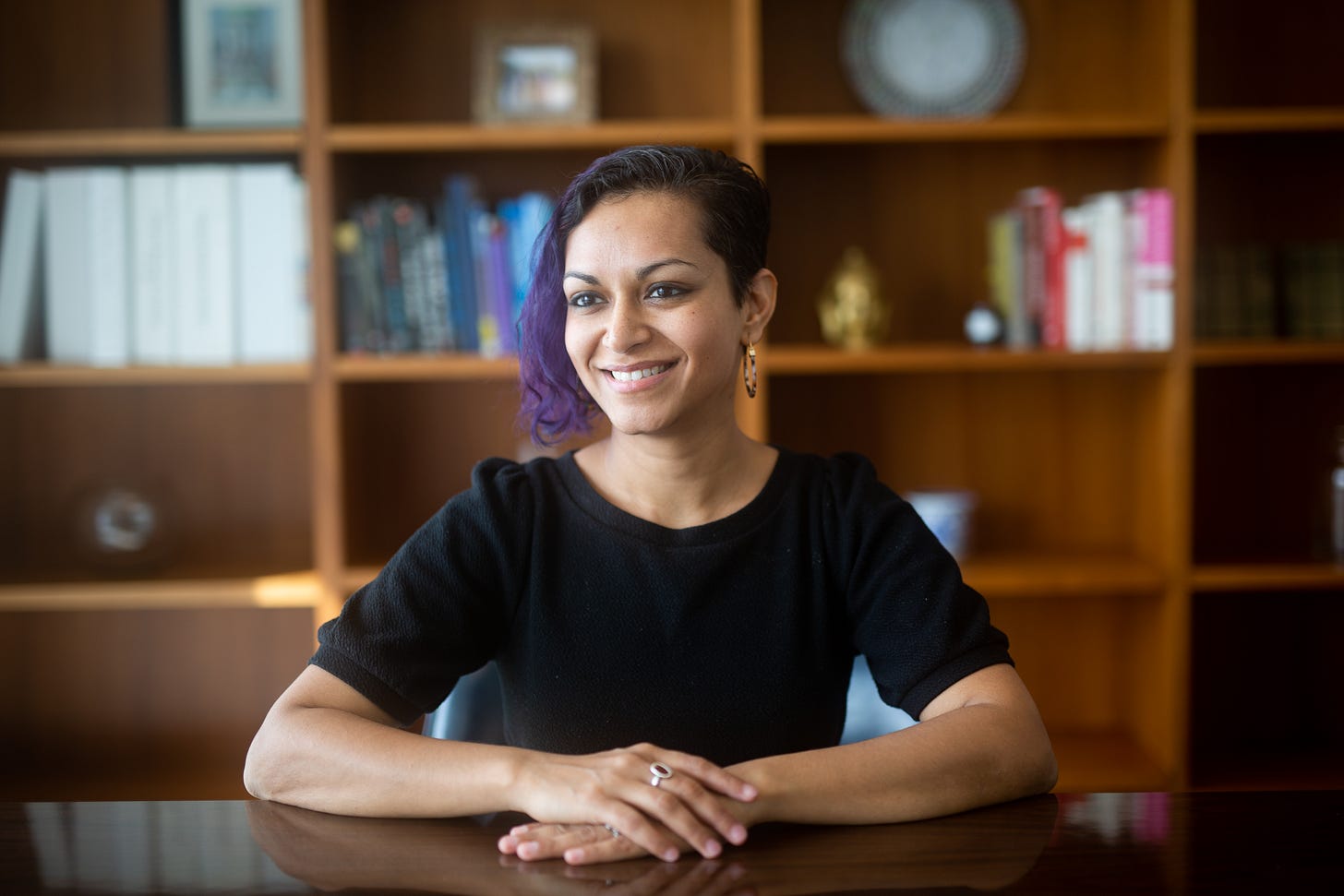Hello PostMortem readers! I’m Dr Devika Bhushan, a pediatrician and public health leader focused on well-being, health innovation, equity, and resilience. I live openly with bipolar disorder, am an immigrant to the US, and a parent. I write Ask Dr Devika B here on Substack.
I love Emi’s writing, thinking, and way of looking at the world; she has been a guest on my podcast and Substack — links to her wonderful episode appear below.
Today, I want to give you a close look behind the scenes of what ended up being an unexpectedly viral moment in my life: on August 26, 2022, I shared my journey with bipolar disorder publicly for the very first time, across three settings, all on the same day.
I did so:
As an op-ed in the LA Times; followed by an op-ed in NPR on the reactions I received — both were read by millions, and I still get frequent reachouts from people wanting to share their stories and the impact sharing mine has had on them
In person, during a keynote at NAMI California’s annual conference
On social media — the most viral reception a Tweet of mine has received to date (despite lack of professional video editing)
What led to this moment?
At the time, I was serving as acting Surgeon General for California, along with the Office’s first Chief Health Officer — and in these roles, I was leading the state through the early days of implementing the ACEs Aware initiative, focused on transforming the way healthcare addresses the effects of childhood trauma. I was also collaborating on public health response to crises like COVID to the national formula shortage.
I was 35, mother to my first baby — freshly back from parental leave — when I was appointed acting Surgeon General. Over those months, I was very much developing my own voice and at times, quelling a fierce imposter syndrome.
I also knew that my own lived experience was pivotal to the way in which I approached my work. My unique lens as an immigrant, with periods of financial and sociocultural struggle; as someone with bipolar disorder, who knew firsthand how long it can take to receive the right diagnosis and discover the right mix of biobehavioral treatments — all the hard work it takes to stay well; and as a new parent all deeply shaped my approach to policy and practice change.
I knew that I wanted to use my platform to help people struggling with mental illness and their loved ones know they were not alone — and that with the right combination of boundaries, self-care strategies, and treatments, they would go on to thrive.
Bipolar disorder is a particularly stigmatized health condition, and naming it as a chronic health condition and a part of my daily life as a Governor-appointed public official felt deeply important, joining my voice to those brave others who had done the same. Not only is mental illness stigma especially pervasive when it comes to those who serve in public office, but stigma has very real consequences for treatment access, the likelihood of recovery and life potential. In fact, provider and societal stigma and bias against those of us with mental illness mean that we live shorter (by two decades) and less healthy lives by mechanisms that are complex and multi-layered.
What did it take behind the scenes?
On the surface, this ‘coming out’ moment was virally successful. Behind the scenes, it took hours of planning and effort and rolling with a series of failures. I think it’s important to peel back these layers to show exactly what a moment like this can take, and to share how to replicate such an approach to advocacy.
For instance, I sent the below pitch in a rolling fashion to 18 successive outlets who either declined or did not reply, before being accepted by a total of 3 outlets. (Two editors were out of office when I reached out to them — so I moved forward after a couple of days of not hearing back. They ended up reaching back out to me a few days later with interest, after I had already confirmed publication with the LA Times.)
Personal Essay: Acting California Surgeon General’s Journey with Bipolar Disorder
Dear editors:
My name is Dr. Devika Bhushan, and I’m the Acting Surgeon General for California. In my role as a top public health spokesperson in the country’s largest state, I am working to normalize and de-stigmatize living with mental health conditions — especially crucial today, with the rise in mental health struggles post-pandemic.
In that pursuit, on August 26, 2022, for the first time, I will publicly share my story of living with bipolar disorder, during my keynote address at the National Association of Mental Illness (NAMI) California’s annual conference.
I’ve also penned a narrative piece about my journey with bipolar disorder — a story that has never been told before — included below. I am looking for an outlet to partner with to publish this piece at the end of August, to accompany my remarks at the NAMI California conference.
I would be thrilled to be able to share my exclusive story with the readers of [Outlet Name]. Please let me know if you would be interested in publishing this piece.
I look forward to your response, and I thank you in advance for your consideration.
Warmly,
Devika
Once accepted, the piece itself underwent significant reduction and rework with an exceptionally talented editor, Maret Orliss, at the LA Times, who approached my story with the utmost care and helped me shape every word, comma and intention, shepherding me through about 10 drafts.
Of note, to give me maximum control over the timeline and messaging, I worked on the essay and social media messages on my own time and as a private citizen.
Ahead of time, though, I sent drafts of the piece to my counterparts in the Governor’s office and at California’s Health and Human Services, so as to be very open and transparent about my messaging, and to not catch anyone off guard when it came out. Note that I did not seek anyone’s permission — I didn’t want there to be any surprises.
The video confession and accompanying messages took several days to draft in parallel with the op-ed — again, on my own time. The video itself had about 10 failed takes. Looking back at it now and with more video editing experience under my belt, I would edit out the background noise and publish a slightly more polished version, but that’s one of the takeaways here: you grow, you learn continuously and the work you put out reflects the best you could do at the time, under the constraints you had then.
What happened after that?
I’ve written previously on the immediate effects of making this confession. Since my disclosure two years ago today, I’ve been able to advance innovation in health equity and well-being in a number of ways. That includes joining forces with an incredible international team to make a documentary about bipolar disorder called Brainstorm; joining the national Board of the National Alliance on Mental Illness; becoming a strategic advisor to venture capital investment in mental health innovation, to startups, and to non-profits bolstering equity and resilience; becoming an adjunct faculty member at Stanford; building a storytelling platform to continue dispelling stigma and bias; and serving as Chief Medical Officer at Daybreak Health, where we bring personalized mental health support to youth in schools — at no cost to families. I also routinely connect with people on various parts of their mental illness recovery journeys.
Above all, my disclosure has enabled me to live authentically and in joyful resonance with my values — as the same person internally as I am now privileged to be externally. Though it was by no means easy or straightforward, I am so glad that it happened the way it did.
If you’re contemplating publicly opening up about a story or perspective that you’re nervous to share, here’s my advice:
Sit with it until you are confident you are ready to release this part of yourself. Crystallize which pieces of the story you are able to unpeel safely (ie those you have processed) and which to hold in for now. Please know that it will not be easy, and will often involve what feel like very personal setbacks (like rejected pitches of what feels like a piece of your soul). But somehow, in the end, your voice will find a way to be heard, to make a resonant difference. In raising it, and ultimately in joining with many other voices, you will become part of the chorus of change you wish to see in the world.
Wishing you light,
Dr Devika Bhushan
Dr. Devika Bhushan is a pediatrician, public health leader, author, and keynote speaker with expertise in health innovation, stress and resilience, trauma-informed systems, and gender and health equity. Dr. Bhushan serves on Stanford’s adjunct faculty, as Chief Medical Officer at Daybreak Health, which brings virtual mental health support directly to youth in schools, and as a senior strategic advisor to entities that aim to advance health, innovation, and equity, ranging from non-profits to a venture capital fund. She also serves on the Boards for the National Alliance on Mental Illness and the California Partners Project. She is an award-winning mental health spokesperson, first disclosing her own mental health journey publicly while serving as Acting Surgeon General for California. She appears in the documentary BrainStorm (2025) and leads a newsletter community (askdrdevikab.substack.com) and YouTube channel/podcast (youtube.com/@drdevikab) to share evidence-based insights for well-being. Dr. Bhushan trained at Harvard Medical School and Johns Hopkins. She is a parent, an immigrant, and a first-generation Indian-American.
Say hi to my new Managing Editor for Post-Mortem, Farah Faye! She is the host of the Scrappy Reading Series, and is an emerging writer living in Brooklyn, NY with her husband and cat. She holds an MFA in Creative Nonfiction from Spalding University and her work has appeared in Shondaland, Business Insider, Medium, and her Substack, art monster magazine. You can find her on Instagram @whoisfarahfaye and @scrappyreadingseries.








Love the article, Dr Devika Bhushan! My believe has always been - if you are going to lead, lead by example, and you did that by writing about and disclosing your bipolar disorder! Bravo! Being a tech consultant for many years in which my job consists of managing customers and users expectations, it's always good to be open and transparent - because nobody wanted to be blindsided by something (being a tech consultant or any consultant also means I am a bit of a control freak lol). And your insights into what it takes to open yourself up (or to do anything) will require planning and in a way, control, is awesome!
I think your post on here has a lot of nuances and people can definitely benefit from reading it.
Thank you!
Thank you for sharing your health journey with the world, Dr Bhushan. I've recently "come out" as disabled, which I kept hidden my whole life for fear of being fired/not hired because of other people's incorrect assumptions that disability is another word for laziness. Not only showing the success but the struggles of high-achieving individuals, as you said, brings context and nuance to the conversations about health.